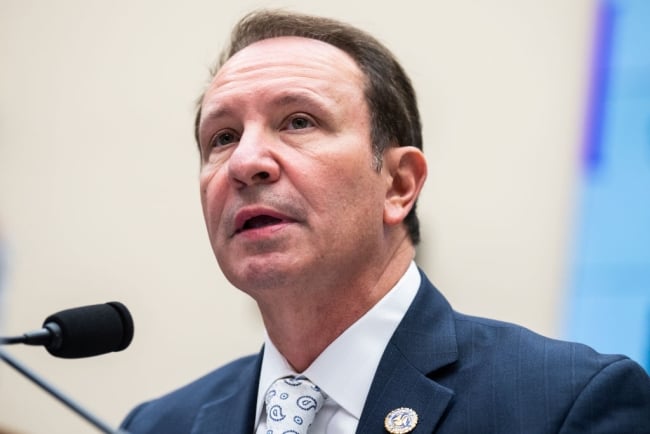You have /5 articles left.
Sign up for a free account or log in.

Republican governor Jeff Landry signed the bill into law Wednesday afternoon.
Tom Williams/CQ-Roll Call, Inc via Getty Images
Louisiana governor Jeff Landry signed a bill into law Wednesday that grants him new powers to directly appoint board chairs at the state’s public colleges and universities. Landry, a Republican, then immediately ousted University of Louisiana system board chair Jimmy Clarke and re-appointed Mark Romero, who held the role under previous governor John Bel Edwards in 2019.
The bill landed on Landry’s desk on May 31 after flying through the state legislature with strong Republican support. Sponsored by Republican senator Valarie Hodges, the controversial bill reflects a growing push from conservative lawmakers to exercise greater influence in higher education governance. Critics, however, have raised concerns that the legislation could be an overstep that threatens public institutions’ accreditation status and with it, their ability to receive crucial federal funding.
The bill first passed the Senate with an initial vote of 28 to 10 on May 7 before easily getting through the House on May 28, receiving amendments that only further reinforced gubernatorial power.
Experts predicted that when it went back to the Senate for re-approval, the lawmakers would reject the amendments and send it to a conference committee for further discussion. But Senate president Cameron Henry, a Republican who had previously doubted the bill’s progression, told The Louisiana Illuminator that senators got more comfortable with the proposal once they learned it only applied to boards for which the governor appoints a majority of members.
Mary Papazian, executive vice president of the Association of Governing Boards of Universities and Colleges (AGB), was disappointed to see such strong political support for the bill, noting that it removes the ability for the board to choose its own chair.
“The chair is often selected because the person is well-respected among their peers and is able to facilitate discussion amongst the board,” she said. “If the chair is seen as partisan, it could undermine their authority amongst board members.”
Papazian also expressed concern that the bill could threaten institutional autonomy and undermine board members’ ability to adhere to their fiduciary duties.
“Boards think independently and act collectively, and partisan agendas can imperil an institution’s long-term success … While boards should seek input from many different sources, including lawmakers, they also have a legal duty to protect their institutions from any influence that may conflict with the priorities that the board has established in collaboration with the president,” Papazian said.
The Southern Association of Colleges and Schools Commission on Colleges (SACSCOC), the accrediting body for Louisiana’s public universities, requires that governing boards for its accredited institutions remain free from undue external influence.
Rosalind Fuse-Hall, director of legal and governmental affairs at SACSCOC, declined to provide Inside Higher Ed a full analysis before Landry signed the legislation, but said the bill “as passed by both chambers and sent to the Governor could raise questions regarding an institution’s compliance with standards of the Principles of Accreditation.”
The SACSCOC Board of Trustees makes the final decision on accreditation-related actions at its June and December meetings. But as Fuse-Hall told The Illuminator, determining a violation of the principles is not as simple as a thumbs-up or thumbs-down.
Even if the rule does not violate accreditation standards on its face, the law could lead to the board being undermined by external force, and that would be a violation, which could lead to loss of accreditation, Papazian said. Colleges and universities that aren’t accredited can’t receive federal funding under Title IV of the Higher Education act.
Fuse-Hall was careful to note that although SACSCOC is a “gatekeeper” of sorts for federal financial aid, it doesn’t have the final say.
“Whether this bill will jeopardize an institution’s federal financial aid is a decision that is made by the federal student aid office and not SACSCOC,” she said.
According to The Illuminator, Hodges doesn’t deny that the intentions behind the bill are political. “We need to align policy initiatives on the boards and commissions with the Republican governor that we elected to get the job done,” she said.
Michael Poliakoff, president and CEO of the conservative American Council of Trustees and Alumni supports the bill.
“Given the urgency of major reforms, it is reasonable for the governor, who is responsible for the public institutions in his/her state, to select the person who will lead the board,” he said.
In previous comments to local news media, Governor Landry said the bill is about ensuring accountability—that taxpayer dollars invested in higher education result in positive outcomes.
“This fight is all about universities,” he said in an April interview with WAFB-TV. “The people of this state are ready for these universities to start taking some responsibility for putting out students that are graduating with degrees that they can’t even get a job for.”
Other state governors have made similar moves to gain greater authority over higher education boards. In Florida, Governor Ron DeSantis has taken aim at “woke activism” by pushing legislation to defund DEI, and using a swath of board member replacements to drive a conservative overhaul of New College of Florida. He also signed off on a bill that undercut transparency in presidential searches; several Republican lawmakers have since been tapped to lead Florida colleges.
And in Virginia, a controversial memo sent from Attorney General Jason Miyares to Governor Glenn Youngkin unequivocally stated that by law the university board members have a “primary duty” to the commonwealth and therefore the governor. Democrats in the legislature tried to counter the governor’s assertion through a bill that would let universities hire their own counsel and not have to default to counsel provided by the Attorney General’s office. But that was quickly vetoed.




